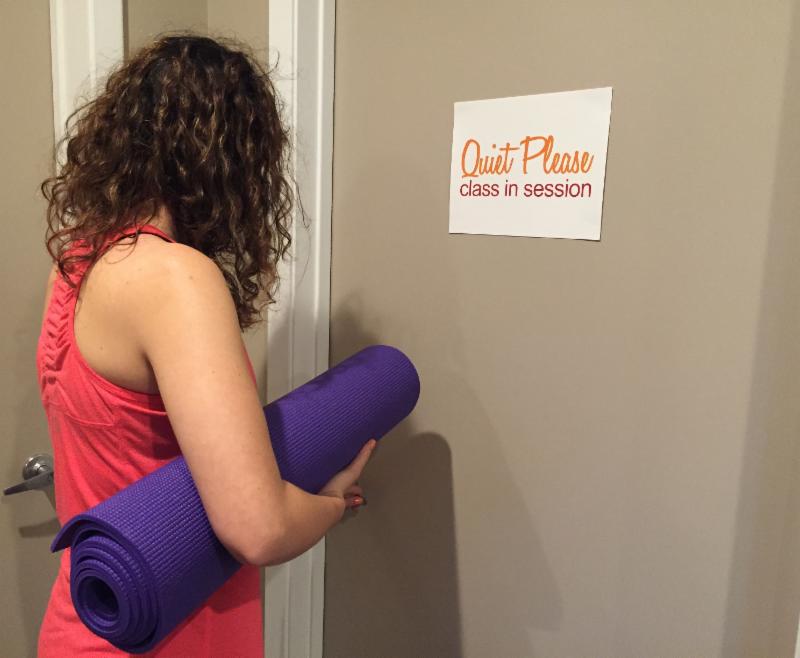Have You Been Unintentionally Stealing?
Earlier this week we made a new-ish student pretty upset with us. She arrived several minutes late for a class and the staff at our front desk would not let her into the class. Of course we never want to exclude our students from class or make them angry (after all, our mission is Yoga for EveryBody), but we do want to protect the sacredness of the time and space of the yoga class.
Our Yoga Etiquette guidelines on our website recommend that students “Arrive a few minutes before your class. Late arrivals are disruptive to the teacher and the students who have set down their mats and settled in for practice.”
Given the increasing number of late arrivals we’ve had in recent weeks, I think it’s time to shine a light on this guideline and explain in more detail why it’s so important that everyone arrive on time.
 According to the yogic concept Asteya, being late for an appointment or meeting is a form of stealing. It’s stealing people’s time. Allow me to explain…
According to the yogic concept Asteya, being late for an appointment or meeting is a form of stealing. It’s stealing people’s time. Allow me to explain…
Stealing from Classmates
When people come to a yoga class, they have planned and committed time for their yoga practice, for their self-care. One of the main reasons people come to yoga is to restore some peacefulness into their hectic lives. When a person arrives late to class, they create disruption and unintentionally steal from their classmates’ peaceful experience.
Depending upon how late the person arrives, their entry into class may have different repercussions.
If the class has already begun, everyone has already set up a space for their mat and props. When a person comes in late, depending on the size of the class, some classmates may need to stop their practice, get up, and reposition their mat and props to make space for the late person.
A late arrival might interrupt the centering practice. That means that just as people are doing the work of shifting their awareness out of their heads and settling into their bodies, the late person’s arrival, even if they try to minimize disruption, can abruptly bump their classmates’ awareness back into their minds.
And from a more literal perspective, when a person arrives late they are stealing from their classmates’ financial investment in the class. Our classes are defined to be 60 minutes long (for the most part), and people expect 60 minutes of instruction.
When a person arrives late, their classmates are disrupted, the teacher’s train of thought is disrupted, thus disrupting the quality and flow of the class. As a result, unfortunately, the students do not receive the full 60 minutes of instruction they expected.
Stealing from Themselves
A student’s late arrival might mean that they come into class when the yoga practice has already begun. If this is the case, the late student is also stealing from their own experience.
The teacher may not have time to check in with the late student to find out about any injuries, issues, or conditions they may have that day, so the teacher may not provide a practice that is 100% appropriate and beneficial.
Or, the late student may miss the warm up and need to jump into the practice at a point when the poses have become inappropriately challenging for a person who just walked in the door. This may, unfortunately, lead to a less-than-great practice or even an injury.
Stealing from the Teacher
When a student comes in late for class, it can cause a lot of stress for the teacher. First, the teacher might need to help the latecomer find a spot for their mat. Then, in order to help the student begin their practice without further delay, and in an effort to minimize disruption, the teacher may need to fetch the student’s props *while* they continue teaching *and* keeping an eye on all the students to make sure they’re understanding the instructions and their alignment is correct and safe.
The teacher may worry that the late student has not had time to properly warm up and is entering the practice at a point when the poses have already become challenging. They may be concerned that they do not know whether the student has any injuries, issues, or conditions that may affect their practice. All of these concerns and efforts steal the teacher’s peace.
If the teacher can find time to check in with the student, they may realize that the practice they planned and began teaching is not appropriate for the late student, and they may have to scramble to change their lesson plan mid-class. This can be extremely challenging and stressful.
I can tell you from personal experience that on a few occasions when I’ve taught a class where many of the students are dealing with serious issues in their bodies (knee replacements, herniated discs, carpal tunnel syndrome, fibromyalgia, recovering from a car accident), and I’ve figured out a lesson plan and begun teaching a practice that is appropriate and beneficial for everyone in the class, if a person comes in late and they have a new issue I need to take into consideration, it can completely throw off the rest of the class.
Without an opportunity to stop, collect my thoughts, and replan the class, the rest of the practice feels like a disaster, a random assortment of yoga poses that really doesn’t serve anyone. The quality of the instruction really suffers, and you can be sure that this kind of situation will really steal the teacher’s peace.
So…
Having students arrive late for class is a really difficult situation. Of course we want to be welcoming and inclusive, but we also want to protect everybody's experience. And in order to do that we need to set some clear expectations.
Please make every effort to arrive early enough that you can set down your belongings, check in, use the restroom if needed, drink some water if you want to, select the props you want for class, and be on your mat and ready to begin at the time the class is set to start.
Usually, arriving 10-15 minutes before your class time is perfect. If you have a little extra time you can relax on your mat for a few minutes and start getting present for your practice.
If it’s your first visit to the studio and you have trouble finding us, or if you are a regular student who has gotten stuck in unexpected traffic or have had some other unforeseen issue, and you know you’re going to be late, please give us a call (512-318-2112) if you can so that we can be prepared for your late arrival.
And please know that we absolutely cannot allow anyone to enter a class more than 5 minutes late because we want to make sure we’re providing a high quality experience and keeping you safe.
And by the same token, please plan to stay until the end of class. Packing up and leaving before the end of class causes the same kind of disruption as someone arriving late.
We very much appreciate your understanding on this, and we look forward to seeing you soon!

XO, Zelinda
P.S. We'd love to hear from you on this. Please feel free to leave a comment here or send us an email if you'd prefer to send a private note.
Asteya: Non-Stealing
In the US, we often think of yoga as the physical yoga poses we do while standing on our yoga mats. Yoga is actually much more than that. Yoga is comprised of 8 "limbs" or "branches," and the physical yoga poses, asanas, are just one of those limbs. The 8 limbs in order are:
- Yamas - ethical rules for dealing with others
- Niyamas - ethical rules for ourselves
- Pranayama - breathing practice to direct our energy
- Asana - physical yoga poses
- Pratyahara - withdrawal from our 5 senses
- Dharana - focus
- Dhyana - sustained focus (meditation)
- Samadhi - becoming one with the object of meditation
Today I'd like to spotlight one of the Yamas that is important to me: Asteya (ah-stay-yah).
Asteya is a Sanskrit word that translates simply as non-stealing. On the surface, this seems simple: don't take things that don't belong to you. But if you dig deeper, there's so much more.
Non-Coveting Asteya can also mean not coveting - do not want for something that is not yours. If, for example, you admire and desire your friend's purse or car or physique, it will only cause you pain and waste your energy. "Oh I love her car, I wish I could afford her car, my life would be so much better if I had a car like hers." When you have these thoughts, you begin to believe that your life is lacking. You focus on what is missing in your life, rather than appreciating all do you have.
Non-Hoarding Another aspect of asteya is non-hoarding - do not amass things you do not need or do not need yet. The problem with hoarding (for me, this tends to happen in my kitchen pantry and garage) is that it creates a mindset of scarcity and creates stress. "There's not enough to go around, I need to stock up on these things just in case." Then you realize you've made a big investment in things you don't need, or don't need yet, plus you have a ton of stuff and clutter to deal with. Or worse yet, your hoarding creates a situation where another person does not get their due.
Instead, practice buying or taking only what you need. Cultivate a mindset of abundance, knowing that when and if you need more of something, the grocery store or the universe will have it in stock for you.
Subtle Aspects of Non-Stealing Of all the aspects of asteya, the one that resonates most with me personally is one that is so subtle you might not ever have thought about it - do not obstruct other people's desires. This applies mostly to people's time, dreams, and habits. The example that comes up on almost a daily basis is stealing people's time.
How many times has a telemarketer tried to keep you on the phone to sell you something you don't need or want? That telemarketer was stealing your time. It was your time that you did not want to give, and he was taking it, so in essence he was stealing.
The same applies for in-person conversations where one of the people hangs on too long. Have you ever been in a situation where you're finished talking to a person and they just keep going on and on? They are stealing your time.
Being late for appointments is another way to steal someone's time. If you agree to meet someone at a certain time, you have set aside that time for them. You stop your previous activity to be prepared for their arrival. If they arrive late, it is a signal that they do not respect your time. You are wasting your precious time waiting for them, instead of potentially doing something more productive or meaningful. Before I was aware of this concept of stealing, I was chronically late. Now I make a conscious effort to arrive on time and if I'm going to be late, I let the other person know as soon as I realize I'm going to be late.
Another way of stealing by obstructing other's desires is to squash their dreams. Say your friend tells you she's planning to go back to school. Out of jealousy or some other emotion, you tell her why you think her decision is a bad one. Maybe you tell her the school has a bad reputation or why you think her chosen field is a poor choice. You are stealing her happiness and her dream by poo-pooing it.
Finally, if you've ever been in or witnessed a situation where a person doesn't allow another person to just be themselves, you've seen an example of someone stealing another person's humanity. The common adage of a girlfriend trying to change her boyfriend is a good example. When someone criticizes or tries to change their partner's or friend's habits or personality, they are stealing from their humanity, their uniqueness, the fiber of what makes them, them.
Who knew non-stealing could be such a deep and complex topic?
Now that you know about the yogic concept of asteya, you might find yourself more aware of subtle forms of stealing. You might protect yourself and your energy by not allowing people to steal from you. You might find new ways to be loving and respectful toward the people in your life.
What do you think about asteya? I'd love to hear your thoughts in the Comments section below. Do you consider coveting and hoarding as forms of stealing? Have people been stealing your time? Have you unknowingly been stealing other people's time? What methods might you employ to not allow people to steal from you?

Until next time, Lots of love, Zelinda
